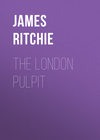Buch lesen: «Christopher Crayon's Recollections. The Life and Times of the late James Ewing Ritchie as told by himself»
CHAPTER I.
East Anglia in 1837
In 1837 Lord Melbourne was Prime Minister – the handsomest, the most cultivated, the most courteous gentleman that ever figured in a Royal Court. For his young mistress he had a loyal love, whilst she, young and inexperienced, naturally turned to him as her guide, philosopher and friend. The Whigs were in office, but not in power. The popular excitement that had carried the Reform Bill had died away, and the Ministry had rendered itself especially unpopular by a new Poor-Law Bill, a bold, a praiseworthy, a successful attempt to deal with the growing demoralisation of the agricultural population. Lord Melbourne was at that time the only possible Premier. “I have no small talk,” said the Iron Duke, “and Peel has no manners,” and few men had such grace and chivalry as Lord Melbourne, then a childless widower in his manhood’s prime. He swore a good deal, as all fine gentlemen did in the early days of Queen Victoria. One day Mr. Denison, afterwards Lord Ossington, encountered Lord Melbourne as he was about to mount his horse, and called attention to some required modification in the new Poor-Law Bill. Lord Melbourne referred him to his brother George. “I have been with him,” was the reply, “but he damned me, and damned the Bill, and damned the paupers.” “Well, damn it, what more could he do?” was the rejoinder. And in East Anglia there was a good deal of swearing among the gentry. I can remember an ancient peer who had been brought up in the Navy, who resided in the Eastern Counties, and who somehow or other had been prevailed upon to attend as chairman at a meeting of the local Bible Society. I have forgotten the greater part of the noble Lord’s speech, but I well remember how his Lordship not a little shocked some of his hearers by finishing up with the remark – that the Bible Society was a damned good Society, and ought to be damned well supported. Another noble Lord, of Norfolk, had some fair daughters, who distinguished themselves in the hunting field, where they had a habit of swearing as terribly as an army in Flanders. In this respect we have changed for the better; ladies never swear now.
In politics bribery and corruption and drunkenness everywhere prevailed. It was impossible to fight an election with clean hands. In 1837 there was an election at Norwich; the late Right Hon. W. E. Forster has left us a good account of it. “Went to the nomination of city candidates this morning. The nomination was at eight. Went in with the mob into the lower court. Great rush when the door was opened. When the Crier demanded attention for the reading of the Act against bribery and corruption, he burst out laughing at the end, in which he was followed by the Sheriff, candidates and almost everybody else.” The show of hands was, as was generally the case, in favour of the Liberal. But on the next day – that of the poll – the Tories were declared to have the majority. All round the polling booths the rioting was great, as men were brought up in batches to vote – each party struggling to prevent their being done by the other, and a good deal of fighting ensued. Mr. Forster writes: – “About nine I sallied forth to take observations. At the Magdalen Ward booth I saw some dreadful cases of voting by drunken people, both Whig and Tory – one in which the man could hardly speak, and there were two men roaring Smith and Nurse (the names of the Whig candidates) in his ears. I went to see all the polling places in the course of time. About three I saw some furious bludgeon-fighting in Palace Plain, the police taking bludgeons from some Tory hired countrymen. The Mayor and Sheriff were there. One of the police was badly wounded by a bludgeon. The soldiers were sent for, and then the Mayor, thinking he could do without them, sent George Everett, the Sheriff’s son, a boy, and myself to stop them. We very soon met them in the road leading from the Plain to the barracks trotting forward with their swords drawn. We held up our hands and partially stopped them, but the Mayor altered his mind and they came on. The policemen had got the better, but the soldiers soon cleared the place.”
The election over – it is said to have cost £40,000 – the triumphant Members were borne in chairs on men’s shoulders and carried through the streets – a very unpleasant process, as they had to smile and bow to the crowd of lookers-on in the streets and in the houses along which they passed. The old dragon Snap from St. Andrew’s Hall figured in the show. Out-voters were brought from London and other parts of the country in stage coaches hired for the purpose. Every one showed his colour, and every one was primed with beer and ready for a row. A General Election was a saturnalia of the most blackguard character. In all, Norfolk returned twelve Members – four for the county, the Eastern Division sending two Members, the influential landlords being Lord Wodehouse, the Earl of Desart and the Marquis of Cholmondeley, with an electorate of 4,396. In West Norfolk the electors were not so numerous, and the influence was chiefly possessed by the Earl of Leicester, Lord Hastings, the Marquis of Cholmondeley, Lord Charles Townshend and the Marquis of that name. In both divisions Conservatives were returned. In the Eastern Division of Suffolk, which had its headquarters at Ipswich, the electorate returned two Members – Lord Henniker and Sir Charles Broke Vere. The leading landlords were the Earl of Stradbroke, the Duke of Hamilton, the Marquis of Hertford, the Dysart family, and Sir Thomas Gooch. Sir Thomas had represented the county up to the time of the Reform Bill; in 1832 Robert Newton Shawe was elected. West Suffolk, whose chief electoral town was Bury St. Edmund’s, returned Tories, under the influence of the Marquis of Bristol and other landlords. The boroughs did a little better; Bury St. Edmund’s returned one Liberal, Lord Charles Fitzroy, elected by 289 votes, and Lord Jermyn (C.), who polled 277 votes. Colchester, however, a very costly seat to gain, was held by the Conservatives. Chelmsford and Braintree were the chief polling places of Essex north and south, and in both divisions Conservatives were returned. Eye rejoiced in its hereditary representative, Sir Edward Kerrison, Conservative. It is strange that so small a borough was spared by the first Reform Bill. In our time it has been very properly disfranchised. Sudbury, a Suffolk borough, a little larger, which returned two Conservatives in 1837, was very properly disfranchised for bribery in 1844. Ipswich was also supposed to be by no means an immaculate borough. Dodd writes concerning it: “Money has long been considered the best friend in Ipswich, and petitions on the ground of bribery, &c., have been frequent.” In 1837 it returned one Liberal and one Conservative, Milner Gibson, whom Sir Thomas Gooch, of Benacre Hall, recommended to the electors as a promising Conservative colt. He lived to become M.P. for Manchester, to be one of the leaders of the Anti-Corn Law Movement, the head of the Society for the Repeal of the Taxes on Knowledge, a society which owed a great deal of its success to his Parliamentary skill as a tactician, and to be a Member of a Liberal Administration. There were few finer, manlier-looking men in the House of Commons than Thomas Milner Gibson. At any rate, I thought so as I watched him, after the delivery of a most effective speech in Drury Lane Theatre on the Corn Laws, step into a little ham and beef shop close by for a light for his cigar. At that time, let me remind the reader, waxlights and matches were unknown. The electoral body in Ipswich was not a large one. At the Reform Act period it consisted of 1,800. At that time the constituency had been increased by adding to the freemen, of whom little more than three hundred remained, the ten-pound householders within the old borough, which included twelve parishes. It is curious to note that, in 1839, Mr. Milner Gibson, who had resigned his seat on his becoming a Liberal, was rejected, the numbers being – Sir Thomas Cochrane (Conservative), 621; Milner Gibson, 615. Ipswich seems always to have been undergoing the excitement of a General Election – and, it is to be feared, enjoying the profits of an election contest, as no sooner was an election over than it was declared void – and a new writ was issued. In 1837 Thetford, no longer a Parliamentary borough, returned two M.P.’s, one Conservative and one Liberal. A little more has yet to be written relative to smaller East Anglian boroughs. Lynn, under the influence of the Duke of Portland, in 1837 returned two distinguished men to Parliament: Lord George Bentinck, then a great racing man, but who was better known as the leader of the Protectionist party, and Sir Stratford Canning, the great Eltchi, who was to reign imperiously in the East, and at whose frown Turkish Sultans trembled. Maldon returned two Conservatives. It has long very properly ceased to exercise that privilege. Great Yarmouth, which has now an electorate of 7,876, at the General Election in 1837 returned two Liberals, but the highest Liberal vote was 790, and the highest Tory vote 699. Money was the best friend at Yarmouth, as in most boroughs. In accounting for the loss of his seat at Weymouth in 1837, one of our greatest East Anglians, Sir Thomas Fowell Buxton, writes: – “My supporters told me that it would be necessary to open public-houses, and to lend money – a gentle name for bribery – to the extent of £1,000. I, of course, declined.” Yet, as a boy, I must own I enjoyed the fun, the excitement, the fighting of the old elections, much more than the elections of later times. If now and then a skull was cracked, what mattered, while the Constitution was saved!
In the religious world the change in East Anglia has been immense; the Church was weak, now it has become strong. In most of the villages were good Dissenting congregations, but the landlords set their faces against the Dissenters – “pograms” was what they were contemptuously called – and the landlord’s lady had no mercy on them. The good things in the hall were only reserved for those who attended the parish church. At that time we had two bishops; both resided in Norwich. One was the Bishop of the Diocese; the other was the Rev. John Alexander, who preached in Princes Street Chapel, where the Rev. Dr. Barrett has succeeded him – a man universally beloved and universally popular, as he deserved to be. As for the clergy of that day, I fear many of them led scandalous lives: there was hardly one when I was a boy, within reach of the parish where I was born, whom decent women, with any serious thoughts at all, could go to hear, and consequently they, with their families, went to the nearest Independent Chapel, where it was a sight to see the farmers’ gigs on the green in the chapel yard. They go to the Church now, as the clergyman is quite as devoted to his high calling and quite as earnest in his vocation as his Independent brother. Bishop Bathurst had let things slide too much, as was to be expected of a man whose great complaint in his old age was that they had sent him a dean who could not play whist. Bishop Stanley’s wife complained to Miss Caroline Fox how trying was her husband’s position at Norwich, as his predecessor was an amiable, indolent old man, who let things take their course, and a very bad course they took. It was in his Diocese – at Hadleigh – the Oxford movement commenced, when in 1833 the Vicar, the Rev. James Rose, assembled at the parsonage – not the present handsome building, which is evidently of later date – the men who were to become famous as Tractarians, who had met there to consider how to save the Church. It was then in danger, as Lord Grey had recommended the Bishops to put their house in order. Ten Irish Bishoprics had been suppressed; a mob at Bristol had burnt the Bishop’s palace; and in Norwich the cry had been raised for “more pigs and less parsons.” One of the leaders of the Evangelical party resided at Kirkley. The Rev. Francis Cuningham – afterwards Rector of Lowestoft – had established infant schools, which were then a novelty in East Anglia. His wife was one of the Gurneys, of Earlham, a great power in Norfolk at that time. Joseph John was well known in London philanthropic circles and all over the land, especially in connection with the anti-Slavery and Bible Societies; and at his house men of all religious parties were welcome. At that time, Clarkson, the great anti-Slavery advocate, had come to Playford Hall, near Woodbridge, there to spend in quiet the remainder of his days. In all East Anglian leading towns Nonconformity was very respectable, and its leading men were men of influence and usefulness in their respective localities. It was even so at Bury St. Edmund’s in Mr. Dewhurst’s time. His son, whom I met with in South Australia holding a position in the Educational Department, told me how Rowland Hill came to the town to preach for his father. As there were no railways the great preacher came in his own carriage, and naturally was very anxious as to the welfare of his horses. Mr. Dewhurst told him that he need have no anxiety on that score, as he had a horsedealer a member of his church, who would look after them. “What!” said Rowland Hill, in amazement, “a horsedealer a member of a Christian Church; whoever heard of such a thing?” From which I gather that Rowland Hill knew more of London horsedealers than East Anglian ones. I can well remember that many of the old Nonconformist pulpits were filled by men such as Ray of Bury St. Edmund’s, Creak of Yarmouth, Elvin of Bury (Baptist), Notcutt of Ipswich, and Sloper of Beccles, a friend of Mrs. Siddons. A great power in Beccles and its neighbourhood was the Rev. George Wright, the father of the celebrated scholar, Dr. Aldis Wright, of Cambridge, who still lives to adorn and enlighten the present age. Some of the old Nonconformist chapels were grotesque specimens of rustic architecture. This was especially so at Halesworth, which had a meeting-house – as it was then called – with gigantic pillars under the galleries. It was there the Rev. John Dennant preached – the grandfather of the popular Sir John Robinson, of The Daily News, a dear old man much given to writing poetry, of which, alas! posterity takes no heed. The charm of the old Nonconformist places was the great square pews, lined with green baize, where on a hot Sunday afternoon many a hearer was rewarded with – I can speak from experience – a delightful snooze. The great exception was at Norwich, where there was a fine modern Baptist Chapel, known as “the fashionable watering-place,” where, in 1837, the late William Brock had just commenced what proved to be a highly-successful pastoral career.
As to the theology of the cottagers in East Anglia at that time, I can offer no better illustration of it than that given by Miss Caroline Fox of a cottage talk she had somewhere near Norwich. She writes, “A young woman told us that her father was nearly converted, and that a little more teaching would complete the business,” adding “He quite believes that he is lost, which, of course, is a great consolation to the old man.”
Literature flourished in East Anglia in 1837. Bulwer Lytton, an East Anglian by birth and breeding, had just published “Paul Clifford,” and was about to commence a new and better style of novel. Norwich had long been celebrated for its Literary Society, and one of the most remarkable of the literary men of the age was George Borrow, author of the “Bible in Spain,” the materials for which he was then collecting, and who spent much of his life in East Anglia, where he was born. He was five years in Spain during the disturbed early years of Isabella II., and he travelled in every part of Castile and Leon, as well as the southern part of the Peninsula and Northern Portugal. Again and again his adventurous habits brought him into danger among brigands and Carlists, as well as Roman Catholic priests, and he experienced a brief imprisonment in Madrid. At Norwich also was then living Mrs. Opie – as a Quakeress – after having spent the greater part of her life in London gaiety. A lady who met her in Brussels says she spoke with much enthusiasm of the eminent artists, who, in her part of the world – videlicet, the Eastern Counties – had become men of mark. Of her husband, who had been dead many years, she said playfully that if neither Suffolk nor Norfolk could boast of the honour of being his birthplace, he had done his best to remedy the evil by marrying a Norwich woman. At Reydon Hall, rather a tumble-down old place, as I recollect it, lived the Stricklands, and of the six daughters of the house five were literary women more or less successful. Of these the best known was Agnes, author of “The Lives of the Queens of England,” which owed much of its success to being published just after the Princess Victoria had become Queen of England.
It was amusing to hear her talk, in her somewhat affected and stilted style, of politics. She was a Jacobin, and hated all Dissenters, whom she sneered at as Roundheads. With modern ideas she and her sisters had no sympathy whatever. There never was such an antediluvian family. All of them were very long-lived, and must have bitterly bewailed the progress of Democracy and Dissent. I question whether the “Lives of the Queens of England” has many readers now. Near Woodbridge, as rector of Benhall, lived the Rev. J. Mitford, an active literary man, the editor of The Gentleman’s Magazine, and of some of the standard works known as Pickering’s Classics. As a clergyman he was a failure. It was urged in his defence, by his friends, that his profession had been chosen for him by others, and that when it was too late for him to escape from the bonds which held him in thrall he made the discovery that the life that lay before him was utterly uncongenial to his tastes and habits. His life, when in Suffolk, writes Mrs. Houston, author of “A Woman’s Memories of World-known Men,” must have been a very solitary one. For causes which I have never heard explained, his wife had long left him, and his only son was not on speaking terms with the Rector of Benhall. In his small lodgings on the second floor in Sloane Street, he was doubtless a far happier man than, in spite of his well-loved garden and extensive library at Benhall Rectory, he ever, in his country home, professed to be. But perhaps the most notable East Anglian author at the time was Isaac Taylor, of Ongar, whose books – “The Natural History of Enthusiasm” and “The Physical Theory of Another Life” – were most popular, and one of which, at any rate, had been noticed in The Edinburgh Review. In a private letter to the editor, Sir James Stephen describes Taylor “as a very considerable man, with but small inventive but very great diffusive powers, possessing a considerable mastery of language, but very apt to be over-mastered by it – too fine a writer to write very well; too fastidious a censor to judge men and things equitably; too much afraid of falling into cant and vulgarity to rise to freedom and ease; an over-polished Dissenter, a little ashamed of his origin among that body; but, with all this, a man of vigorous and catholic understanding, of eminent purity of mind, happy in himself and in all manner of innocent pleasure, and strenuously devoted to the grand but impracticable task of grafting on the intellectual democracy of our own times the literary aristocracy of the days that are passed.” Quite a different man was dear old Bernard Barton, the Quaker poet, of Woodbridge, with whom I dined once, who was more fat than bard beseems, and who seemed to me to enjoy a good dinner, a glass of port – people could drink port in those days – and a pinch of snuff, quite as much as any literary talk. Poor Bernard never set the Thames on fire – he would have been shocked at the thought of doing anything so wicked; but he was a good man, and quite competent to shine in “Fulcher’s Pocket Book,” a work published yearly by Fulcher, of Bury St. Edmund’s, and much better than any of its contemporaries.
In connection with this subject let me quote from Bernard Barton a sketch of a Suffolk yeoman, very rare in these times: “He was a hearty old yeoman of about eighty-six, and occupied the farm in which he lived and died, about fifty-five years. Sociable, hospitable, friendly; a liberal master to his labourers, a kind neighbour, and a right merry companion within the limits of becoming mirth; in politics a staunch Whig; in his theological creed as sturdy a Dissenter; yet with no more party spirit in him than a child. He and I belonged to the same book club for about forty years. He entered it about fifteen years before I came into these parts, and was really a pillar in our literary temple, not that he greatly cared about books or was deeply read in them, but he loved to meet his neighbours and get them round him on any occasion or no occasion at all. As a fine specimen of the true English yeoman I have met few to equal, hardly any to surpass him, and he looked the character as well as he acted it, till within a very few years, when the strong man was bowed with infirmity. About twenty-six years ago, in his dress costume of a blue coat and yellow buckskins, a finer sample of John Bullism you would rarely see. It was the whole study of his long life to make the few who revolved about him in his little orbit as happy as he always seemed to be himself; yet I was gravely queried with, when I happened to say that his children had asked me to write a few lines to his memory, whether I could do so in keeping with the general tenor of my poetry. The speaker doubted if he was a decidedly pious character. He had at times been known in his altitudes to vociferate at the top of his voice a song, the chorus of which was not certainly teetotalish: —
Sing, old Rose, and burn the bellows,
Drink and drive dull care away.”
Can anything be finer than this picture of a Suffolk yeoman? Is it not a pity that such men are no more to be seen? High farming was unknown when the old Suffolk yeoman lived. I claim for Bernard Barton that this sketch of the Suffolk yeoman is the best thing he ever wrote. Bernard Barton’s daughter married the great Oriental scholar, Edward Fitzgerald, the friend of Carlyle and correspondent of Fanny Kemble, who lived in the neighbourhood of Woodbridge, and whose fame now he is no more is far greater than when he lived. Little could he have anticipated that in after years literary men would assemble in the quiet churchyard of Boulge to erect his monument over his grave, or to found a society to perpetuate his name.
As I lean back for another glance, my eyes, as Wordsworth writes, are filled with childish tears —
My heart is idly stirred.
I see the dear old village where I was born, almost encroaching on Sir Thomas Gooch’s park, at Benacre Hall; I see the old baronet, a fine old bigoted Tory, who looked the picture of health and happiness, as he ambled past on his chestnut cob, wearing a blue coat, a white hat and trousers, in summer; his only regret being that things were not as they were – his only consolation the fact that, wisely, the Eternal Providence that overrules all human affairs had provided snug rectories for his kith and kin, however unworthy of the sacred calling; and had hung up the sun, moon and stars so high in the heavens that no reforming ass
Could e’er presume to pluck them down, and light the world with gas.
Then comes the village medico, healthy and shrewd and kindly, with a firm belief – alas! that day is gone now – in black draught and blue pill. I see his six sunny daughters racing down the village street, guarded by a dragon of a governess, and I get out of their way, for I am a rustic, and have all the rustic’s fear of what the East Anglian peasant was used to term “morthers”; and then comes the squire of the next parish, in as shabby a trap as you ever set eyes on, and the fat farmer, who hails me for a walk, and going to the end of a field, joyously, or as joyously as his sluggish nature will permit, exclaims, “There, Master James, now you can see three farms.” My friend was a utilitarian, and could only see the beautiful in the useful. Then I call up the memory of the village grocer, a stern, unbending Radical, who delights me with the loan of Cruikshank’s illustrations to the “House that Jack Built,” mysteriously wrapped in brown paper and stowed away between the sugar and treacle. He does not talk much, but he thinks the more. And now it strikes me that conversation was not much cultivated in the villages of East Anglia in 1837, and yet there were splendid exceptions – on such evenings as when the members of the Book Club met in our parlour, where the best tea things were laid, and where a kindly mother in black silk and white shawl and quakerish cap made tea; where an honoured father, who now sleeps far away from the scene of his life-long labours, indulged in a genial humour, which set at ease the shyest of his guests; and again, what a splendid talk there was when the brethren in black from Beccles, from Yarmouth, from Halesworth, gathered for fraternal purposes, perhaps once a quarter, to smoke long pipes, to discuss metaphysics and politics, and to puzzle their heads over divines and systems that have long ceased to perplex the world. Few and simple were East Anglian annals then. It was seldom the London coach, the Yarmouth Mail and Telegraph brought a cockney down to astonish us with his pert ways and peculiar talk. Life was slow, but it was kindly, nevertheless. There was no fear of bacteria, nor of poison in the pot, nor of the ills of bad drainage. We were poor, but honest. Are we better now?
In 1837 the railways which unite the country under the title of the Great Eastern had not come into existence.
All is changed in East Anglia except the boys. “You have seen a good many changes in your time,” said the young curate to the old village clerk. “Yes,” was the reply; “everything is changed except the boys, and they’re allus the same.” I fear the boys are as troublesome as ever – perhaps a little more so now, when you cannot touch them with a stick, which any one might do years ago. When we caught a boy up to mischief a stick did a deal of good in the good old times that are gone never to return.
In connection with literature one naturally turns to the Bungay Printing Press, at the head of which was John Childs, who assembled round his hospitable board at Bungay many celebrated people, and to whom at a later period Daniel O’Connell paid a visit. It was Childs who gave to the poor student cheap editions of standard works such as Burke and Gibbon and Bacon. It was he who went to Ipswich Gaol rather than pay Church Rates. It was he who was one of the first to attack the Bible printing monopoly, and thus to flood the land with cheap Bibles and Testaments. A self-made man, almost Napoleonic in appearance, with a habit of blurting out sharp cynicisms and original epigrams, rather than conversing. He was a great phrenologist, and I well remember how I, a raw lad, rather trembled in his presence as I saw his dark, keen eyes directed towards that part of my person where the brains are supposed to be. I imagine the result was favourable, as at a later time I spent many a pleasant hour in his dining-room, gathering wisdom from his after-dinner talk, and inspiration from his port – as good as that immortalised by Tennyson. Mr. Childs had a numerous and handsome family, most of whom died after arriving at manhood. His daughter, who to great personal charms added much of her father’s intellect, did not live long after her marriage, leaving one son, a leading partner in the great City firm of solicitors, Ashurst, Morris, and Crisp. After John Childs, of Bungay, I may mention another East Anglian – D. Whittle Harvey, who was a power in his party and among the London cabbies – to whom the London cabby owes his badge V.R. – which, as one of them sagely remarked, was supposed to signify “Whittle ’Arvey,” an etymology at any rate not worse than that of the savant who in his wisdom derived gherkin from Jeremiah King. In 1837 Mr. Johnson Fox, born at Uggeshall, near Wangford – better known afterwards as the Norwich “Weaver Boy,” the “Publicola” of The Weekly Dispatch– the great orator of the Anti-Corn Law League, was preaching in the Unitarian Chapel, South Place, Finsbury, and a leading man in London literary society. One of the best-known men in East Anglia was Allan Ransome, of Ipswich, the young Quaker, who was on very friendly terms with the Strickland family, who cultivated literature and business with equal zest. Nor, in this category, should I pass over the name of George Bird, of Yoxford, a local chemist, who found time to write of Dunwich Castle and such-like East Anglian themes – I fancy now read by none. A Suffolk man who was making his mark in London at that time was Crabbe Robinson, the pioneer of the special correspondent of our later day. And just when Queen Victoria began to reign, Thomas Woolner, the poet-sculptor, was leaving his native town of Hadleigh to begin life as the pupil of Boehm, sculptor in ordinary to the Queen. And yet East Anglia was by no means distinguished, or held to be of much account in the gay circles of wit and fashion in town. The gentry were but little better than those drawn to the life in the novels of Fielding and Smollett. I am inclined to think there was very little reading outside Dissenting circles – where the book club was a standing institution, and The Edinburgh Review was looked up to as an oracle, as indeed it was, sixty years ago. There was little encouragement of manly sports and pastimes – indeed, very little for any one in the way of amusement but at the public-house. Not that any one was ever drunk, in the liberal opinion of the landlord of the public-house, only “a little fresh,” and the village policeman was unknown. It is true there might be a constable, but he was a very mythical person indeed. Everybody drank, and as a rule the poorer people were the more they drank.



















